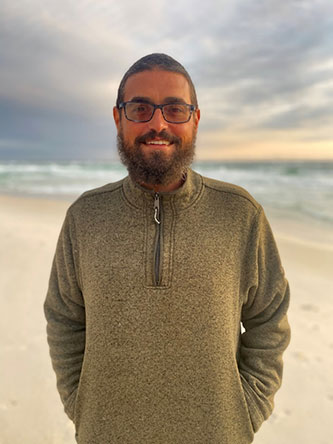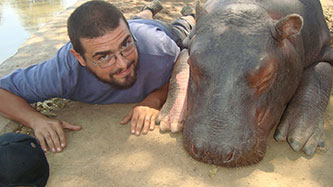New Faculty Profile: Daniel A. Shtob

Assistant Professor Daniel A. Shtob
The newest faculty member in the School of Humanities and Social Sciences is Assistant Professor Daniel A. Shtob, appointed to the Department of Sociology and teaching in the Urban Sustainability Program. The Brooklyn native's current research interests include environmental sociology; climate change; natural disaster; environmental justice; law and finance; and urban socio-spatial policies. He describes his research focus as investigations of "systems of risk and liability," particularly environmental risk and how those risks "feed into social inequality." In general he is looking at the present and future of environmental change and the mechanisms of how environmental change turns into environmental harm and social inequality.
Shtob only recently received his Ph.D. in environmental studies, sciences, and policy from the University of Oregon, having been awarded his degree in June 2020, but his professional experience is impressive and extensive and has all led to the stellar work he is doing in his chosen field. He received his B.A in anthropology, magna cum laude, from the University of Pennsylvania. While conducting research for his senior thesis on a study abroad program in Zimbabwe, he was first exposed to the impact of the environment in creating and maintaining social inequities. During the six months he spent in Zimbabwe researching the complementary nature of modern and traditional health systems, he got a firsthand look at how systems of social inequality can be constructed. After graduating from the University of Pennsylvania, Shtob went on to Vanderbilt University Law School in Nashville, Tennessee, where he earned his juris doctor degree. Indeed, he practiced law for many years before moving into his current field, with first an M.S. in environmental studies, then an M.A. in sociology a year later, and then a Ph.D. in environmental studies last June.
Before he became passionate about environmental justice, Shtob pursued law and as admitted to the New York Bar, a license he still holds. In the years he worked as an attorney, he practiced corporate law, primarily in his firm's Finance & Real Estate Practice Group, focusing on acquisition of commercial real estate, real estate mergers, and leasing commercial properties. His pro bono projects included helping to develop and manage subsidized housing and ensure HUD compliance, assisting small businesses with start-up real estate and other matters. His pro bono work garnered him his law firm's Pro Bono Service Award.

Future Professor Shtob, relaxes with a rescue hippopotamus in Zambia.
But it was his passion to apply his analytical skills to questions of environmental justice that inspired him to give up his corporate job and go back to Africa. Thus, after several years practicing law in New York, and deciding that was not the career he wanted, Shtob joined the Peace Corps and worked as a forestry extension agent in Kazembe Chiefdom, Zambia (2011–13). For two years, he introduced farmers to techniques designed to increase food production and quality while mitigating environmental damage and introduced sustainable income-generating activities. He promoted village-level food security projects, including initiatives to increase crop diversity, support beekeeping, and educate about diet and nutrition. After his Peace Corps service ended, rather than immediately leave Africa, he took up a job as a community outreach manager at the Chihemble Wildlife Education Trust in Mfuwe, Zambia, from 2013 to 2014. There he developed a community conservation education program for residents of villages near the Chihemble national park, which includes some of the highest wildlife concentrations in Africa. The curricula covered basic conservation and ecology; mitigation of human-wildlife conflict; sustainable income generation; the sustainable use of forest products; and the use of alternative fuels.
Shtob combines his experience in both the law and environmental sustainability into his current research and publications. For example, his work in real estate law supports his research on how experiences with hurricanes interact with real estate development, design, and finance to pattern potential coastal risk and inequality. His legal background helps him analyze how the interactions of law, finance, resilience, and climate disasters such as hurricanes Irma and Michael have catalyzed socio-environmental impacts in Florida.
Naturally, his publications reflect his years of research and activism in sustainability and environmental justice. With Larissa Petrucci he recently completed an article for the journal Environmental Justice, entitled, "Gendered Care Work and Environmental Injustice: A Feminist Analysis of Educator's Emotional Labor in Disaster Recovery." With Patrick Greiner and Jordan Besek he completed "Is Urbanization Good for the Climate? A Cross-County Analysis of Impervious Surface, Affluence, and the Carbon Intensity of Well-Being" for Socius. In 2019 he published "Remembering the Future: Natural Disaster, Place, and Symbolic Survival" in Rural Sociology. That same year with Jordan Besek, he published "Breaking the Divide: Setting Environmental Precedent in the Chicago River" in Law & Policy.
His numerous conference presentations and ongoing projects also center issues of climate change and social inequality looking, for example, at coastal population projections and sea level rise estimates for the next century to predict future patterns of environmental inequality. Since he claimed this field as his own, his papers have reflected his passion for environmental justice and the law. For example, he recently had a paper accepted with Jordan Besek to Sociological Forum that seeks to suggest ways to better integrate environmental sociology and legal studies.
Though only recently hired and never having been in residence on campus due to COVID restrictions, Shtob is already having an impact on the college as a teacher and adviser. He is appointed in the Department of Sociology and the Program in Urban Sustainability and in fall 2020 remotely taught Sociology of the Environment; Race, Class, and Environmental Justice; and Introduction to Urban Sustainability. This spring he is remotely teaching Sociological Quantitative and Theory. He has developed and is supervising an internship program that places Brooklyn College undergraduates from the Urban Sustainability Program with the Regional Planning Association to study New York City's digital economy waste streams. This semester he is overseeing an undergraduate thesis on the social drivers and efficacy of 1970s-era environmental laws, due in June 2020.
His future plans include working with the Jamaica Bay project and another project which would bring Brooklyn College students into the process of mapping coastal change on a neighborhood-by-neighborhood basis by walking New York's 520 miles of coastline. That he successfully collaborates with other scholars and pulls students into his research projects is clear from the two grants he is currently working on. On one project, he is the co-principal investigator for an interdisciplinary team that consists of five graduate students from four universities to study the impacts of Hurricane Maria on Puerto Rico's agro-food systems. Secondly, he is a co-principal investigator with Professor Erin Moore looking at environmental impacts on the law, the people and the architecture of the Florida Keys resulting from Hurricane Irma. We are truly excited to welcome Daniel Shtob to the college, confident that he will lend his energy and resourcefulness to the Urban Sustainability Program.






